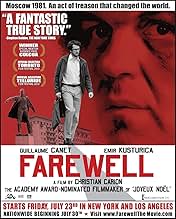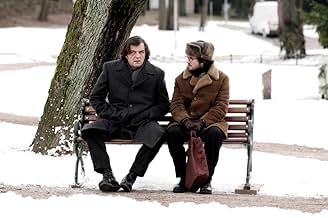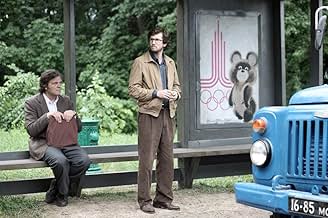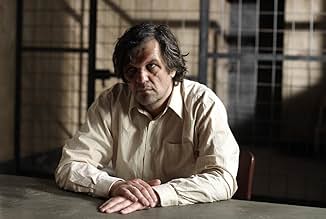IMDb रेटिंग
6.9/10
7.1 हज़ार
आपकी रेटिंग
अपनी भाषा में प्लॉट जोड़ेंThe French intelligence service alerts the U.S. about a Soviet spy operation during the height of the Cold War, which sets off an unfortunate chain of events.The French intelligence service alerts the U.S. about a Soviet spy operation during the height of the Cold War, which sets off an unfortunate chain of events.The French intelligence service alerts the U.S. about a Soviet spy operation during the height of the Cold War, which sets off an unfortunate chain of events.
- निर्देशक
- लेखक
- स्टार
Aleksey Gorbunov
- Choukhov
- (as Oleksii Gorbunov)
Evgeniy Kharlanov
- Igor
- (as Yevgeni Kharlanov)
Timothé Riquet
- Damien
- (as Timothe Riquet)
Vsevolod Shilovskiy
- Gorbachev
- (as Vsevolod Shilovsky)
Vladimir Tolstoy
- Chef du KGB
- (as Vladimir Tolsty)
फ़ीचर्ड समीक्षाएं
I had some previous knowledge of the Farewell-affair, so i came in knowing pretty much what to expect. On the whole they seemed to pull it off pretty well. The one thing that did grate me though were the scenes with Ronald Reagan in them. The acting and dialogue in those are way under par for the movie and seriously impacted my enjoyment of the rest of it.
But yeah. If you want the reverse Snowden then this is the movie for you. The pacing is all right. It is not horribly complicated, as far as spy thrillers go.
A tense dropoff here, an escape here, some exposition of character motivation, some family drama, a whiff of secrecy and an outcome which is never in doubt.
But yeah. If you want the reverse Snowden then this is the movie for you. The pacing is all right. It is not horribly complicated, as far as spy thrillers go.
A tense dropoff here, an escape here, some exposition of character motivation, some family drama, a whiff of secrecy and an outcome which is never in doubt.
My film group and I saw "Farewell" at Rendez-Vous with French Cinema at Lincoln Center in New York. We all loved it. I do hope it will have a commercial release soon so more people can see it. The acting was superb, the screenplay riveting. We did not know the story so we were kept on the edges of our seats. I gained a lot of insights into what was going on in the cold war and emerged with a very different take on what had happened and increased appreciation for the leaders of France and the U. S. and appreciation for the brave Russian agent and what he did for the world. I am looking forward to reading the book on which the film was based. The opening and closing were so beautiful and meaningful -- the meaning only grasped at the end. I will never forget them.
We just returned from seeing this film as part of the Annual French Film Festival at Boston's Museum of Fine Arts, 7/10/10. In the U.S., we have an expression sometimes used to express one's admiration for a certain talented actor/actress who is riveting to watch on screen.I will use this expression here w/ regards to the lead actor, " I could watch Emir Kusturica read the phone book". It is his performance more than any other single factor, that causes me to think very highly of this film.It is a rare thing to watch a film about a real life hero without seeing a film that is also maudlin, clichéd or too simplistic.
But in "Farewell" I felt that the story was compelling,and the screenplay was well written,economical, completely believable and well acted.There were no unnecessary scenes and the whole thing mostly made sense, as sad as that sense was.The cinematography was crummy, but you can't have everything.Besides,I was so mesmerized by K's performance that I didn't really care that much about the cinematography, because my eyes were always focused in on him.As I exited the theater I felt like I had just been hit by a truck, and I am still feeling this film.
But in "Farewell" I felt that the story was compelling,and the screenplay was well written,economical, completely believable and well acted.There were no unnecessary scenes and the whole thing mostly made sense, as sad as that sense was.The cinematography was crummy, but you can't have everything.Besides,I was so mesmerized by K's performance that I didn't really care that much about the cinematography, because my eyes were always focused in on him.As I exited the theater I felt like I had just been hit by a truck, and I am still feeling this film.
In this film the adage "truth is stranger than fiction" is well demonstrated. The real story of Vladimir Vetrov, the KBG Colonel who leaked vital details of the Soviet spy network to the West in the early 1980's is even more bizarre that the story related here, where Colonel Sergei Gregoriev (Emir Kursturica) uses a French electronics engineer Pierre Froment (Guillaume Canet), resident in Moscow, to pass secrets to the French domestic intelligence agency, the DST, and on to the CIA. Sergei ruled out using the DSGT, the French external intelligence service because he was aware it had been penetrated by the KGB. As it is the story here is a little lacking in tension despite the larger than life Sergei becoming more and more reckless as the story progresses .Some of the minor parts are pure vaudeville, Fred Ward's Ronald Reagan for example. However the two principals Kursturica and Canet, both prominent film directors, completely contrasting personalities, are very convincing. The 80's cold war atmosphere is well re-created – even the credits are vaguely menacing.
As in several recent spy stories "based on real events" the viewer is left with the impression that the West and Soviets had so thoroughly penetrated each other's security defences that they might as well have monthly meetings to hand over each other's secrets. This story does suggest that the Soviet Union was not able to keep up with Western technology, particularly in computing, and in resorting to stealing software the Soviets sowed the seeds of their downfall. In one instance the West was able to feed the Soviets with enough crook software to cripple their gas pipelines and cause a truly big explosion (without injuring a single person, apparently).
We do get considerable insight into what motivated Sergei, if not Vetrov (who seems to have been a less admirable character). Sergei is s true believer in communism, but he also fiercely loves his son, whom he wants to inherit something worthwhile. In a way the movie is as much about a parent sacrificing themselves for the sake of their child than the old spy versus spy routine. Froment is a less interesting character, but something inside him keeps him involved with the egregious Sergei despite his own misgivings and that of his wife Jessica (a refugee from East Germany with good reason to be afraid). Perhaps it's the opportunity for an otherwise unremarkable person to do something important. Or maybe he just finds it hard to say "non" to a person as charismatic as Sergei.
This film is not an "edge of your seat" suspense thriller but it tells an absorbing story, and is a useful reminder of the spy paranoia that prospered during the cold war.
As in several recent spy stories "based on real events" the viewer is left with the impression that the West and Soviets had so thoroughly penetrated each other's security defences that they might as well have monthly meetings to hand over each other's secrets. This story does suggest that the Soviet Union was not able to keep up with Western technology, particularly in computing, and in resorting to stealing software the Soviets sowed the seeds of their downfall. In one instance the West was able to feed the Soviets with enough crook software to cripple their gas pipelines and cause a truly big explosion (without injuring a single person, apparently).
We do get considerable insight into what motivated Sergei, if not Vetrov (who seems to have been a less admirable character). Sergei is s true believer in communism, but he also fiercely loves his son, whom he wants to inherit something worthwhile. In a way the movie is as much about a parent sacrificing themselves for the sake of their child than the old spy versus spy routine. Froment is a less interesting character, but something inside him keeps him involved with the egregious Sergei despite his own misgivings and that of his wife Jessica (a refugee from East Germany with good reason to be afraid). Perhaps it's the opportunity for an otherwise unremarkable person to do something important. Or maybe he just finds it hard to say "non" to a person as charismatic as Sergei.
This film is not an "edge of your seat" suspense thriller but it tells an absorbing story, and is a useful reminder of the spy paranoia that prospered during the cold war.
Farewell is the wrought piece of espionage spy fiction you didn't really expect to be as good as it is; as is often the case, films and film-makers take it upon themselves to entrust that elements of espionage and distrust between superpowers, or people therein epitomising superpowers, should make for crash-bang, explosive viewing involving very little narrative; very little character and a whole lot of wooden spectacle. It is with open arms then, that we welcome in Christian Carion's 2011 film Farewell; the anti-thesis to Mission Impossible: II or a badly drawn Bond film of the post-Dalton era. The film is one of its ilk that happens to have both a soul and a brain; these characters are people involved in international espionage and some rather dangerous stuff, but they are people involved in such things whilst doing their utmost to maintain families; they are people involved in what they're in, of whom enjoy playing tennis and reading poetry and listening to Queen – they are human beings; they can be overweight; they can wear glasses; they can relax by watching a Western, they are not stock action heroes of a ridiculously photogenic nature; they are not James Bonds darting around in sports cars out-peddling a space orientated laser beam.
The scene epitomising how Farewell really is different to most others of its ilk arrives with a snappy sequence set on a park bench between two people; as might be considered standard with any film of this ilk, we witness such a sequence that is often the first thing people think of when certain genre buzz words are mentioned. Here, the already seated man witnesses another slump down next to him so that they may continue their business – business which would result in serious ramifications should either of them be caught. Instead of cutting to the chase and prolonging causality, the new arrival first mutters about how he hates the fact he is having an affair with someone away from his marriage; that his son knows all about it and, he feels, hates him as a result. Such is the film's nature to take something familiar to the genre, or something with which we will identify, and spin it around to encompass character; to encompass problems away from what would usually be the sole and lone body of content; to take an instance as stereotypical as two blokes meeting on a park bench and incorporate some sort of air of both naturality and substance to proceedings.
The sense that we're being treated like adults begins with the opening sequence, a procession of found footage depicting numerous things Cold-war orientated ranging from shots taken from the fronts of the Vietnam War to numerous technological advancements of the 1970s alluding to the Space Race. All of it is Cold-War orientated and it arrives without voice-overs informing us of what's what and why we're seeing what we're seeing; there is no brief expositional history lesson. Guillaume Canet pays Pierre Froment, an engineer living in Russia with his family of wife and young daughter; the man observes a television set displaying a McEnroe-Borg tennis match, this sense of there being a fondness for that of duelling; a fondness of keeping up with how two super-powers in a respective field are getting along in their long, intense rivalry prominent.
The film is a double-stranded piece, a piece flicking between two men occupying Moscow in the early 1980s doing their utmost to transfer information from secretive sources onto the Americans, and that of the American president of the time in Ronald Reagan (Ward), no less, who dishes it out to his international colleagues, particularly that of then-French Socialist President François Mitterrand (Magnan), when he isn't confining with his own. Pierre's friend is Emir Kusturica's large, life-weary Soviet native to their surroundings Sergei Gregoriev; a man with his own wife and son with whom he does not get along. Sergei uses Pierre as a half-way house in his delivering of top-secret Soviet intelligence which eventually make their way through to the upper-echelons of The White House, a premise spun out by director Carion to really good effect as we delve into this world of lies and power-play.
In spite of the two strands and the array of characters, ranging from this lowly Frenchman to the President of the United States himself, it is Pierre's film; a man caught up in this mucky pool of grime and maltrust and having it go on to affect his home life and general well-being. In a subway fairly early on, it is established how efficient and how clinical the police state work; their picking up of an unknown woman after the insinuation Pierre is in trouble reiterates what he is up against - the verbal establishment beforehand of Pierre's inexperience within this field follows that of Sergei's infiltrating of the backseat to his car with enough ease to fool Pierre as to his even being there. In this regard, the tension is often palpable; if for the fact we often fear Pierre's capture, something that would not stop the film from carrying on with one of its other equilibriums but as to whether his actions will destroy his exemplary home situation and those he holds dear to him. Farewell is the spy thriller peering in at the private lives of these people; the primary stuff about passing on information and keeping informants secret acting as a mere premise to fascinating accounts of how these people exist with themselves; with their families and with one another, the bulk of it making for really good value – you could sure do worse for a thriller.
The scene epitomising how Farewell really is different to most others of its ilk arrives with a snappy sequence set on a park bench between two people; as might be considered standard with any film of this ilk, we witness such a sequence that is often the first thing people think of when certain genre buzz words are mentioned. Here, the already seated man witnesses another slump down next to him so that they may continue their business – business which would result in serious ramifications should either of them be caught. Instead of cutting to the chase and prolonging causality, the new arrival first mutters about how he hates the fact he is having an affair with someone away from his marriage; that his son knows all about it and, he feels, hates him as a result. Such is the film's nature to take something familiar to the genre, or something with which we will identify, and spin it around to encompass character; to encompass problems away from what would usually be the sole and lone body of content; to take an instance as stereotypical as two blokes meeting on a park bench and incorporate some sort of air of both naturality and substance to proceedings.
The sense that we're being treated like adults begins with the opening sequence, a procession of found footage depicting numerous things Cold-war orientated ranging from shots taken from the fronts of the Vietnam War to numerous technological advancements of the 1970s alluding to the Space Race. All of it is Cold-War orientated and it arrives without voice-overs informing us of what's what and why we're seeing what we're seeing; there is no brief expositional history lesson. Guillaume Canet pays Pierre Froment, an engineer living in Russia with his family of wife and young daughter; the man observes a television set displaying a McEnroe-Borg tennis match, this sense of there being a fondness for that of duelling; a fondness of keeping up with how two super-powers in a respective field are getting along in their long, intense rivalry prominent.
The film is a double-stranded piece, a piece flicking between two men occupying Moscow in the early 1980s doing their utmost to transfer information from secretive sources onto the Americans, and that of the American president of the time in Ronald Reagan (Ward), no less, who dishes it out to his international colleagues, particularly that of then-French Socialist President François Mitterrand (Magnan), when he isn't confining with his own. Pierre's friend is Emir Kusturica's large, life-weary Soviet native to their surroundings Sergei Gregoriev; a man with his own wife and son with whom he does not get along. Sergei uses Pierre as a half-way house in his delivering of top-secret Soviet intelligence which eventually make their way through to the upper-echelons of The White House, a premise spun out by director Carion to really good effect as we delve into this world of lies and power-play.
In spite of the two strands and the array of characters, ranging from this lowly Frenchman to the President of the United States himself, it is Pierre's film; a man caught up in this mucky pool of grime and maltrust and having it go on to affect his home life and general well-being. In a subway fairly early on, it is established how efficient and how clinical the police state work; their picking up of an unknown woman after the insinuation Pierre is in trouble reiterates what he is up against - the verbal establishment beforehand of Pierre's inexperience within this field follows that of Sergei's infiltrating of the backseat to his car with enough ease to fool Pierre as to his even being there. In this regard, the tension is often palpable; if for the fact we often fear Pierre's capture, something that would not stop the film from carrying on with one of its other equilibriums but as to whether his actions will destroy his exemplary home situation and those he holds dear to him. Farewell is the spy thriller peering in at the private lives of these people; the primary stuff about passing on information and keeping informants secret acting as a mere premise to fascinating accounts of how these people exist with themselves; with their families and with one another, the bulk of it making for really good value – you could sure do worse for a thriller.
क्या आपको पता है
- ट्रिवियाAlexander Avdeev (Russian ambassador in France who became Russian Culture Minister and who had been expelled from France in 1983 because of Farewell) blocked most Russian actors to play in this movie, including Sergey Makovetskiy and Nikita Mikhalkov, because he did not want to back a movie about a Russian traitor. He also blocked authorizations to film in Moscow, while most of the plot takes place in Moscow. Christian Carion had to pretend to film a Coca Cola advertisement for the few images of the city.
- गूफ़In the Soviet Union, motorists would typically keep their windscreen wipers in their glove compartments for fear of having them stolen, as they were hard to come by. Yet in the movie, every single car has its wipers attached.
- कनेक्शनFeatured in En bonne intelligence (2010)
टॉप पसंद
रेटिंग देने के लिए साइन-इन करें और वैयक्तिकृत सुझावों के लिए वॉचलिस्ट करें
- How long is Farewell?Alexa द्वारा संचालित
विवरण
बॉक्स ऑफ़िस
- बजट
- €1,75,00,000(अनुमानित)
- दुनिया भर में सकल
- $74,06,706
- चलने की अवधि1 घंटा 53 मिनट
- रंग
- ध्वनि मिश्रण
- पक्ष अनुपात
- 1.85 : 1
इस पेज में योगदान दें
किसी बदलाव का सुझाव दें या अनुपलब्ध कॉन्टेंट जोड़ें



































